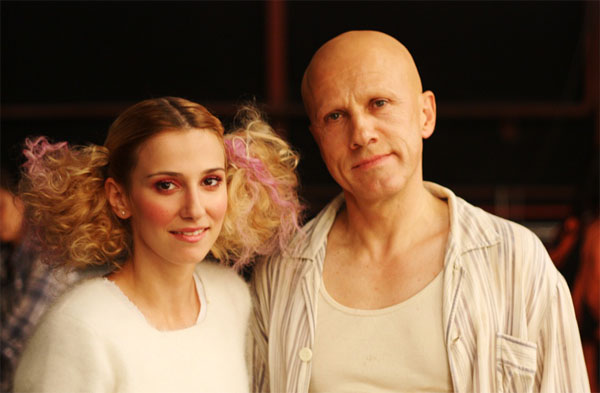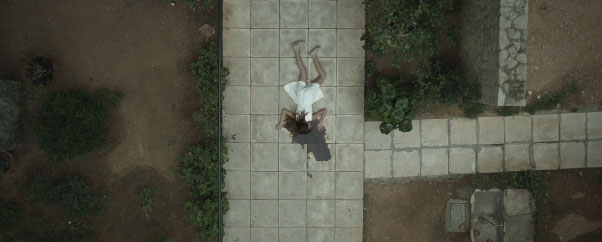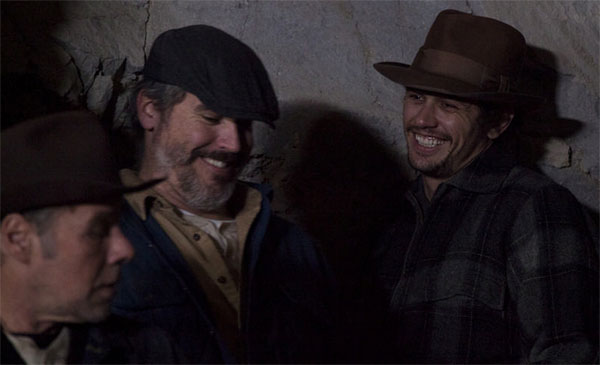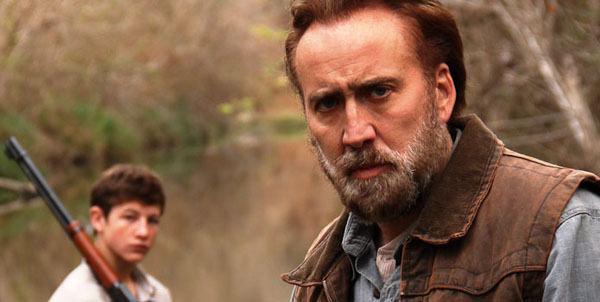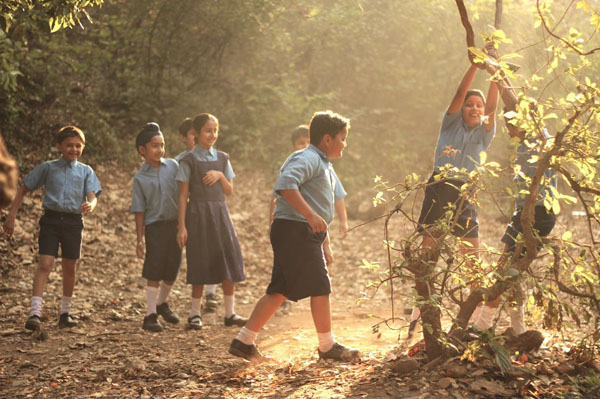The Venice International Film Festival has announced the lineup for its 70th edition.
THE COMPETITION
Merzak Allouache’s Es-Stouh. The English title of the latest from the Algerian filmmaker is The Rooftops. With Adila Bendimerad, Nassima Belmihoub, Ahcene Benzerari, Aïssa Chouat, Mourad Khen, and Myriam Ait El Hadj.
Gianni Amelio’s L’Intrepido. Description from Toronto: “Amelio (Lamerica) directs this affecting and timely story about a middle-aged, precariously employed jack-of-all-trades in Milan, who doggedly tries to get by in an unfeeling city while trying to retain his dignity and his passions.”
Alexandros Avranas’s Miss Violence. From the synopsis at plays2place productions: “On the day of her birthday, eleven-year-old Angeliki jumps off the balcony and falls to her death with a smile on her face. While the police and Social Services try to discover the reason for this apparent suicide, Angeliki’s family keep insisting that it was an accident. What is the secret that young Angeliki took with her? Why does her family persist in trying to ‘forget’ her and to move on with its life?”
John Curran’s Tracks. From Toronto: “Mia Wasikowska (Alice in Wonderland, The Kids Are All Right) stars in the astonishing true story of Robyn Davidson, who in 1977 set out on a solo 2,700-kilometre journey by foot across the Australian Outback.”
Emma Dante’s Via Castellana Bandiera. Dante stars in this adaptation of her own novel. Two cars meet up along a narrow street in Palermo, and neither driver’s in the mood to make way for the other. The town starts taking bets on who’ll give in first.
Xavier Dolan’s Tom à la ferme. From BlackBook: “Adapted from Michael-Marc Bouchard’s [play], Tom at the Farm is a psychological thriller [in which] ‘Stockholm Syndrome, mourning and latent violence permeate a story of lies and imposters. A young ad executive travels to the country for a funeral and discovers that no one there knows his name or his relationship with the deceased.Set deep in the farmlands of Quebec, Tom at the Farm tells of the growing fissure separating city and country and the respective natures of the men that reside there.'”
James Franco’s Child of God. An adaptation of Cormac McCarthy’s novel. As the Playlist‘s Kevin Jagernauth reported in 2011, Franco’d originally set out to adapt Blood Meridian, but then swerved. The IMDb synopsis: “Set in mountainous Sevier County, Tennessee, Child of God tells the story of Lester Ballard, a dispossessed, violent man whom the narrator describes as ‘a child of God much like yourself perhaps.’ Ballard’s life is a disastrous attempt to exist outside the social order. Successively deprived of parents and homes and with few other ties, Ballard descends literally and figuratively to the level of a cave dweller as he falls deeper into crime and degradation.” With Scott Haze, Tim Blake, and Nelson Jim Parrack.
Stephen Frears’s Philomena. From Toronto: “Frears (The Queen) teams with Judi Dench and Steve Coogan for this powerful true story of an unmarried Irish-Catholic woman who, decades after being forced by her community to give up her newborn son, embarks on a search to find him with the aid of a BBC reporter.”
Philippe Garrel’s La Jalousie. From Wild Bunch: “A 30-year-old man lives with a woman in a small, furnished rental. He has a daughter by another woman – a woman he abandoned. A theatre actor and very poor, he is madly in love with this other woman. She was once a rising star, but all offers of work have dried up. The man does everything he can to get her a role, but nothing works out. The woman cheats on him. And then she leaves him. The man tries to kill himself, but fails. His sister visits him in hospital. She’s all he has left—his sister and the theatre.” With Louis Garrel and Anna Mouglalis.
Terry Gilliam’s The Zero Theorem. The story, as outlined on Wikipedia: “Qohen Leth is an eccentric and reclusive computer genius who lives in an Orwellian corporate world and suffers from existential angst. Under the instruction of a shadowy figure known only as ‘Management,’ Qohen works to solve the ‘Zero Theorem’—a mathematical formula which will finally determine whether life has any meaning. Qohen’s work in the burnt-out chapel that serves as his home is interrupted by visits from Bainsley, a seductive woman, and Bob, the teenage son of Management.” With Christoph Waltz, Lucas Hedges, Mélanie Thierry, David Thewlis, Tilda Swinton, and Peter Stormare.
Amos Gitai‘s Ana Arabia. A narrative shot in Israel that Gitai didn’t expect to have completed until next year. With Yuval Scharf, Sarah Adler, Uri Gavriel, Norman Issa, Yussuf Abuwarda, Shady Srur, and Assi Levy.
Jonathan Glazer’s Under the Skin. From Toronto: “Scarlett Johannson stars as a voracious alien seductress who scours remote highways and backroads for human prey, in this sci-fi thriller from director Jonathan Glazer (Sexy Beast, Birth).”
David Gordon Green’s Joe. From Toronto: “Nicolas Cage stars as a hard-living ex-con who becomes friend and protector for a hard-luck kid (Tye Sheridan, The Tree of Life, Mud), in this contemporary Southern gothic tale from acclaimed filmmaker David Gordon Green (George Washington, All the Real Girls).”
Philip Gröning’s The Police Officer’s Wife. From Cineuropa: “The story of a young couple who live in a small town with their four-year-old daughter. The husband is so caught up in his work as a policeman that he gradually becomes increasingly alienated from his wife and daughter who become ever closer to one another as they discover the new town. It is only a matter of time before the conflicts within the family manifest themselves.”
Peter Landesman’s Parkland. According to Wikipedia, the film follows “the events that occurred at Parkland Memorial Hospital after the assassination of John F. Kennedy in 1963.” With Zac Efron, Tom Welling, James Badge Dale, Paul Giamatti, Jacki Weaver, Jackie Earle Haley, Billy Bob Thornton, Marcia Gay Harden, and Bitsie Tulloch.
Hayao Miyazaki’s The Wind Rises. We’ve been gathering early reviews right here.
Errol Morris’s The Unknown Known: The Life and Times of Donald Rumsfeld. Sounds like a companion piece to The Fog of War. From the IMDb: “Former United States Secretary of Defense, Donald Rumsfeld, discusses his career in Washington D.C. from his days as a congressman in the early 1960s to planning the invasion of Iraq in 2003.”
Kelly Reichardt‘s Night Moves. From Toronto: “Jesse Eisenberg, Dakota Fanning and Peter Saarsgard star as radical environmental activists whose act of eco-terror plunges them into a moral maelstrom, in the highly anticipated new film from acclaimed American auteur Kelly Reichardt (Wendy and Lucy, Meek’s Cutoff).”
Gianfranco Rosi’s Sacro Gra. For a year, Rosi lived in a trailer on the GRA or Grande Raccordo Anulare (literally, “Great Ring Junction”), a toll-free, ring-shaped motorway that encircles Rome, collecting stories for this documentary.
Tsai Ming-liang’s Stray Dogs. Anybody? Seems all we know at the moment is that it features Lee Kang-sheng, Lu Yi-ching, Lee Yi-cheng, Lee Yi-chieh, and Chen Shiang-chyi.
OUT OF COMPETITION
Shinji Aramaki’s Space Pirate Captain Harlock. This 3D CG anime, adapted from the original 1978 television series, cost Toei Animation more than any other production in its history. From Twitch, where you can watch the trailer: “It is the year 2977 and the world as we knew it has ended. The Gaia Corporation rule the galaxy after the devastating Homecoming War, fought by people desperate to return to Earth. Having been exiled and vilified, Captain Harlock and the crew of the Arcadia, a Death Shadow Class battle cruiser, are now the only hope for mankind to discover the truth that Gaia are hiding and to return to the home kept from them for centuries.”
Alfonso Cuarón’s Gravity. The opening night film features Sandra Bullock and George Clooney as surviving astronauts on a damaged space shuttle. The new two-minute, single-shot trailer is above.
Salvo Cuccia’s Summer ’82 — When Zappa Came to Sicily. From the San Francisco Film Society: “It’s the tale of a boy who will soon lose his father and of a country that must grow beyond the unbridled violence that has been its curse. Part impressionistic fable, part autobiography—the sixty-minute documentary Summer ’82 blends together evocative cinematography, archival material, and stop motion animation with interviews of people who lived through these tumultuous times.”
Anna Eborn’s Pine Ridge. A documentary.
Alex Gibney‘s The Armstrong Lie. Just yesterday, the New York Times‘ Dave Itzkoff reported that Sony Pictures Classics will release this doc on Lance Armstrong: “Mr. Gibney spent four years following Mr. Armstrong, starting in 2009, as he returned from retirement and unsuccessfully pursued another Tour de France title. ‘Unexpectedly,’ the [SPC] release said, ‘Gibney was also there in 2012 when Armstrong admitted to doping, following a federal criminal investigation, public accusations of doping by his ex-teammates and an investigation by the U.S. Anti-Doping Agency.’ The film project that ‘began as the chronicle of a comeback became an examination into the anatomy of a lie.'”
Miguel Gomes‘s Redemption. A short—and Portugal’s only representation on the Lido this year.
Kitty Green’s Ukraine Is Not My Brothel. A doc on the Ukranian feminist group FEMEN.
Kim Ki-duk‘s Moebius. Last month, in a story for the Hollywood Reporter on Kim’s snipping of a 1’20” in order to submit it for a retrial by the Korea Media Rating Board (which had effectively banned the film from Korean cinemas), Lee Hyo-won noted that “Moebius portrays the destruction of a family as its members give into incestuous sexual desires. The film, much like the director’s 3-Iron (2004), proceeds without dialog, and each scene is important, says the director.” That’s the first teaser above.
Steven Knight’s Locke. Pamela McClintock for the Hollywood Reporter back in February: “Based on an original screenplay from Knight, Locke tells the story of one man’s life unraveling in a tension-fuelled, 90-minute race against time (Knight will shoot in real time over 90 minutes). Ivan Locke has the perfect family, his dream job, and tomorrow should be the crowning moment of his career. But one phone call will force him to make a decision that will put it all on the line.” With Tom Hardy, Olivia Colman, Ruth Wilson, Andrew Scott, Ben Daniels, and Tom Holland.
Lee Sang-il’s Unforgiven. In this remake of Clint Eastwood’s original, Ken Watanabe is “a sworn blade of the shogun retiring to a non-violent existence as a rancher before, as always, they pull him back in Pacino-style,” as Scott Beggs notes at Film School Rejects. He also notes that the trailer (above) “doesn’t have subtitles, but it doesn’t really need them.”
Greg McLean’s Wolf Creek 2. From the IMDb: “The outback once more becomes a place of horror as another unwitting tourist becomes the prey for crazed, serial-killing pig-shooter Mick Taylor.”
Thierry Ragobert’s Amazonia. A documentary about a monkey raised in captivity that’s released into the Amazon forest to fend for itself.
Edgar Reitz’s Home from Home — Chronicle of a Vision. A continuation of the legendary trilogy. In the mid-19th century, hunger and poverty drives hundreds of thousands of Germans to set up a new “other” home in South Africa. With Werner Herzog.
Paul Schrader‘s The Canyons. Written by Bret Easton Ellis and starring Lindsay Lohan and James Deen. An infamously rocky production. See Larry Gross and Schrader himself in the current issue of Film Comment.
Ettore Scola’s Che strano chiamarsi Federico Scola racconta Fellini. Something of a documentary, perhaps more of an essay film, dedicated to Scola’s friend and “lighthouse,” Federico Fellini.
Andrzej Wajda‘s Walesa. Man of Hope. From Toronto: “Wajda tackles the story of another of his country’s legends—former dockworker, Solidarity founder, and eventual Polish president Lech Walesa—in this epic, decade-spanning biopic.”
Wang Bing’s ‘Til Madness Do Us Apart. Still looking for information on this one.
Frederick Wiseman’s At Berkeley. Blake Williams at Ioncinema: “Originally drawn to UC Berkeley’s academic reputation and complexity, Wiseman intends for this documentary—the first made about the campus—to place ‘particular emphasis’ on the management of the university, his footage ranging from freshmen moving into dorms to football games to department meetings.”
ORRIZONTI
Valeria Allievi’s Quello che resta. A documentary.
Serik Aprymov’s Little Brother. From Kazakhstan. With Almat Galym and Alisher Aprymov.
Enrico Maria Artale’s Il terzo tempo. From the Facebook page: “Samuel has spent the last few years in and out of an institution juvenile detention for crimes of theft, assault, drug dealing. Without a real family, is placed in a rehabilitation program and entrusted to Vincenzo, a social worker who crosses a deep identity crisis.”
Agnès B.’s Je m’appelle Hmmm… From the IMDb: “Céline, 11, meets Peter, 60. Together they go on a ‘luminous journey’ in his beautiful red truck. She, escaping her desperate and incestuous father; he, far from his native England and the sad memory of his lost wife and daughter. In the course of a few days, a few words, Céline experiences her first true moments of childhood and lightness, exhilaration and trust. Peter goes towards the last days of a life that he offers, like a sublime and aging angel, to this wounded child.” With Douglas Gordon, Lou-Léila Demerliac, Sylvie Testud, Jacques Bonnaffé, Marie-Christine Barrault, Jean-Pierre Kalfon, and Jean-François Garreau.
Riccardo Bernasconi and Francesca Reverdito’s Death for a Unicorn. From Swiss Films: “Little Billy’s life is tormented by his monstrous aunt, who drags him to the cemetery every day and forces him to clean his dead uncle’s headstone. It is at the cemetery that Billy meets Myrtle, a little phantom suspended between the worlds of the living and the dead. But liberating Myrtle means losing the only real friend Billy has ever had.” With Tilda Swinton (as the narrator), Luis Molteni, Lorenzoluca Gronchi, Emma Fossani, and Elowen McClaud.
Shubhashish Bhutiani’s Kush. From Facebook: “Inspired by a true story: In 1984, Indian Prime Minister Indira Gandhi was assassinated by her two Sikh bodyguards, causing anti-Sikh riots to erupt throughout the country. A teacher travelling back from a field trip with her class of 10-year-old students struggles to protect Kush, the only Sikh student in the class, from the growing violence around him.”
Cécile Bicler’s Toutes les belles choses. From Mezzanine Films: “The sun rises. The wedding party is over. Everyone is asleep except the bride, Jessica. She soon joined by Cathy, who does not sleep either. These are the oldest friends of the earth and they will spend some time together this morning.”
Giorgio Bosisio’s Un pensiero Kalasnikov. From the official site: “Pietro is a simple, introverted boy, a novice at high school. Like his schoolmates he is beginning to face the changes of childhood into adolescence life with its eccentricities and its doubts. Pietro discovers his own body, finds a new interest and wish for the opposite sex, quests for his own personality and finally realizes the need to find himself outside the everyday family life.”
Robin Campillo‘s Eastern Boys. From Films Distribution: “They come from all over Eastern Europe: Russia, Romania, Chechnya. They are Eastern boys. The oldest appear no more than 25; as for the youngest, there is no way of telling their age. They hang around the Gare du Nord train station in Paris. They might be prostitutes, but there is no way of knowing for certain. Muller, a discreet man in his late fifties has his eye on one of them—Marek. One afternoon, Muller gathers his courage and speaks to him. The young man agrees to come visit Muller the following day, at his place. However the next day, when the doorbell rings, Muller doesn’t have the faintest idea that he has fallen into a trap.”
Gia Coppola’s Palo Alto. “A dark drama centered on a group of teens with a penchant for finding trouble,” according to the IMDb. With Emma Roberts, Jack Kilmer, James Franco, Val Kilmer, Keegan Allen, Nat Wolff, and Colleen Camp. Gia, by the way, is Francis Ford’s granddaughter.
Amiel Courtin-Wilson and Michael Cody’s Ruin. A “Cambodian-set romantic drama,” according to IF. “Based on the true story of Robyn Davidson’s 2,700km trek across the Australian desert with four camels and her dog.”
Shahram Mokri’s Fish and Cat. A “social-action film which follows Iranian patterns,” according to Kanoon Iran Novin. “Mokri comments on his film and says that the film lacks satire unlike his previous film. Babak Karimi and Saeed Ebrahimi Far star.”
Lukas Moodysson’s We Are the Best! From Toronto: “Moodysson (Show Me Love, Together) returns with this raucous and ebullient tale of three pre-teen outcasts who form an all-girl punk band.”
Rick Ostermann’s Wolfschildren. A generation of “Wolfskinder” living in east Prussia and the Baltic lost their parents in WWII. This is the story of a boy who, searching for his brother, joins a group of kids fleeing into the forests of Lithuania.
David Pablos’s La vida despues. From the Festival Internacional de Cine en Guadalajara: “Samuel and Rodrigo are teenage brothers living on the outskirts of a small town with their mother, who suffers from a mental disorder. One day she strangely disappears, leaving a note on the table.”
Santiago Palavecino’s Algunas Chicas. Celina, a surgeon, heads off for a few days to the country house of an old friend she has not seen since her student days. Something seems to be happening to Paula, the stepdaughter of her friend, who is conspicuous by her absence. A psychological thriller.
Andrea Pallaoro’s Medeas. From the IMDb: A “daring and lyrical exploration of alienation and desperation through the intimate observation of a family’s inner lives and their relationship to each other and their environment. Without moral judgment, it probes the boundaries of human behavior and the lengths to which people can be driven for love and self-preservation.”
Uberto Pasolini’s Still Life. From Beta Cinema: A “poignant, quixotic tale of life, love and the afterlife. Meticulous and organized to the point of obsession, John May (Eddie Marsan) is a council worker charged with finding the next of kin of those who have died alone. When his department is downsized, John must up his efforts on his final case, taking him on a liberating journey that allows him to start living life at last.”
Alessandro Rossetto’s Piccola Patria. From Facebook: Set in a grimy, muddy and turbid northeastern Italy, this is a tale of desperate vitality. The story of two young girls who move to the countryside.
Andrea Segre’s La prima neve. Focuses on the friendship between Shun Li, a Chinese mother who’s trying to come to Italy, and Bepi, a Slavic fisherman nicknamed ‘the Poet,’ set against the background of the Venetian lagoon.
Sion Sono‘s Why Don’t You Play in Hell? From Twitch‘s Todd Brown: “Kunimura Jun, Tsutsumi Shinichi, Nikaido Fumi, Tomochika, Hasegawa Hiroki, and Hoshino Gen star in a story that Tokyo Hive says ‘focuses on a group of people who are only bound by hatred and that hatred is gradually reaching its boiling point. ‘Muto’ (Kunimura) desperately wants to help his daughter ‘Mitsuko’ (Nikaido) to star in a movie. ‘Ikegami’ (Tsutsumi) has fallen in love with ‘Mitsuko’, but he’s on more than just bad terms with her father. Getting dragged into this complicated situation are the movie director ‘Hirata’ (Hasegawa) and some random man named ‘Kouji’ (Hoshino).”
Ti West‘s The Sacrament. In February, Eli Roth told the Guardian that this’ll be “a found footage docu-style horror movie set it a Jonestown type cult where we watch a mass suicide begin and the film makers are trapped inside. It’s really, really scary.” With Joe Swanberg, AJ Bowen, Kentucker Audley, Amy Seimetz, and Gene Jones.
VENICE CLASSICS
Chantal Akerman‘s Le 15 d’août (1973). Jonathan Rosenbaum in 1990: “[B]ecause she is both Belgian and Jewish, Akerman has a stance that is essentially that of an outsider in an international context. While it is possible to link her work to that of a few other, much lesser known Belgian independents—such as Samy Szlingerbaum, with whom she collaborated on one of her earliest films, the hardly ever shown Le 15/8 (1973)—and to see connections with a few Belgian painters (most notably Paul Delvaux, whose surrealist night scenes bear an eerie resemblance to some of her shots), it is probably even more pertinent to note the degree to which exile is a recurring theme in her work.”
Chantal Akerman’s Hôtel Monterey (1972). A “silent, not-exactly-documentary study of a run-down New York hotel,” notes JR.
Ray Ashley, Morris Engel, and Ruth Orkin‘s Little Fugitive (1953

